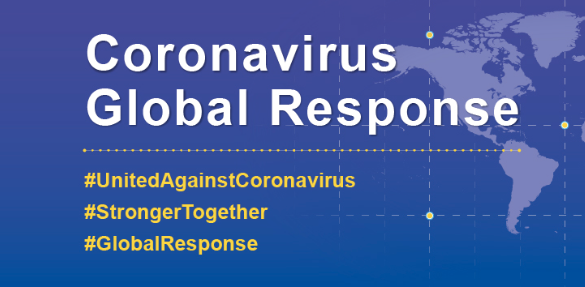On 4 May 2020, European Commission President Ursula von der Leyen hosted the Coronavirus Global Response conference, an on-line pledging event to accelerate the development, production and equitable access to Covid-19 vaccines, diagnostics and therapeutics.
The 59 speakers at the event included representatives of national governments, often including heads of state or royalty; the directors-general of the United Nations and the World Health Organization; and representatives of the Coalition for Epidemic Preparedness Innovations (CEPI), the Vaccine Alliance (GAVI), the Foundation for Innovative New Diagnostics (FIND), UNITAID, the World Bank, the European Investment Bank, philanthropic foundations, the World Economic Forum and pharmaceutical industry associations. Notable among absentees were the United States government and civil society organisations, the latter not by choice. At the closing of the conference, nations and philanthropies had pledged €7.4 billion in financing to respond to the Covid-19 pandemic that has so far affected 3.58 million people and taken 252,000 lives globally.
The money pledged will go towards the development of health products and vaccines to combat Covid-19. Vaccine development in particular is crucial because without an effective vaccine the virus will continue to cause new waves of outbreaks in various places on the planet. Several speakers pointed out that the virus knows no boundaries. For the vaccine to be effective in stopping new outbreaks it will have to be available and affordable globally. It would have to be as widespread as the virus itself. President Macron of France stated that therefore the vaccine ‘won’t belong to anybody’. He called it a Global Public Good. Several other speakers, including Germany’s Chancellor Angela Merkel, repeated those words and promised the vaccine would be affordable. But few offered concrete details on how to achieve universal access or addressed how the knowhow and intellectual property related to the products to be developed will be made available to all humankind. Bernard Pecoul, director of the not for profit drug development group DNDi, offered a 5 step outline for turning the lofty promises into action in a Euractiv oped yesterday, but he was not one of the speakers at the conference. The Guardian on 5 May reported that EU officials had said that ‘pharmaceutical companies who will receive the funding will not be requested to forgo their intellectual property rights on the new vaccine and treatments, but they should commit to make them available worldwide at affordable prices.’
One speaker understood that this will not do. Marisol Touraine, president of the funding agency UNITAID, reminded world leaders that achieving universal access requires action. She recalled the experience of the Medicines Patent Pool in making low-cost antiretroviral medicines needed to treat HIV/AIDS affordable and available. She urged leaders to learn from this positive experience and commit to establishing “a global voluntary pooling mechanism for Covid-19 related technologies, as proposed by WHO and the President of Costa Rica.”
Indeed the €7.4 billion needs to be spent with strings attached. One such string should be the mandatory requirement that intellectual property, knowledge, know-how and technologies whose development is supported by these funds are shared through the WHO Covid-19 pooling mechanism. The World Health Assembly, the annual gathering of health ministers and the governing body of the WHO will meet on 18 May and is expected to discuss the establishment of the pooling mechanism. The Medicines Patent Pool is ready to be part of such a pooling mechanism and has expanded its mandate to be able to work on Covid-19 and to include any health technology that could contribute to the global response.
Ellen ‘t Hoen, LLM PhD, is a lawyer and public health advocate with over 30 years of experience working on pharmaceutical and intellectual property policies.
